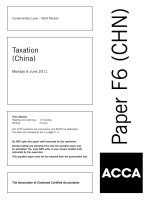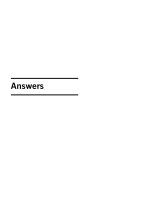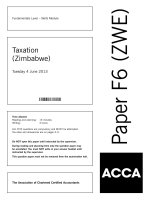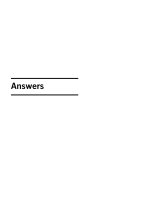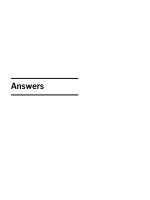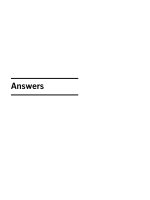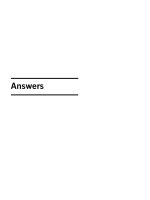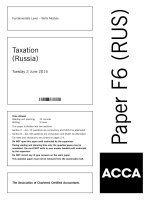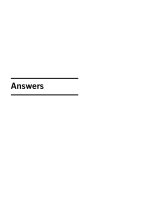ACCA f6 taxation singapore 2012 jun answer
Bạn đang xem bản rút gọn của tài liệu. Xem và tải ngay bản đầy đủ của tài liệu tại đây (124.67 KB, 6 trang )
Answers
Fundamentals Level – Skills Module, Paper F6 (SGP)
Taxation (Singapore)
June 2012 Answers
and Marking Scheme
Marks
1
(a)
H & W Fashion Pte Ltd (HWFPL)
Tax liability for the year of assessment 2012
Basis period: 1 October 2010 to 30 September 2011
$
Net profit as per accounts
Tax adjustments on income
Interest from fixed deposit received (separate source)
Interest from fixed deposit accrued but not received (separate source)
Interest of $1,200 on overdue trade receivables – treated as trade income
Dividend from US (separate source)
Tax adjustments on expenses
Maintenance expenses for company car
Non-compete payment
Depreciation
Legal fees for new sales distributor agreement
Director fees of $120,000 paid to non-residents
Medical fees (only 1% deductible)
Individual tax of $18,500 payable by managing director borne by company
Interest for refinancing of loan of $16,000
Donations ($23,000 + $7,000)
(24,000)
(12,000)
0
(21,000)
––––––––
Trade adjusted profit
Add: Non-Trade Income
Interest on fixed deposit received
Interest on fixed deposit accrued of $12,000 (not earned yet)
US dividends – exempt (‘subject to tax’ and ‘headline tax’ conditions satisfied)
(20,000)
(60,000)
(800)
––––––––
24,000
0
0
––––––––
(100,000)
(40,850)
––––––––
Chargeable Income after full exemption
Tax thereon at 17%
13
(57,000)
0·5
0·5
1·0
0·5
1·0
1·0
0·5
1·0
1·0
1·0
1·0
1·0
1·0
163,000
––––––––
256,000
0
––––––––
256,000
Statutory income
Less: Approved donation ($7,000 x 2·5)
Assessable/Chargeable Income
Less: Full tax exemption
First $100,000 – 100% exempt
Next $81,700 – 50% exempt
0·5
15,000
40,000
56,000
8,000
0
14,000
0
0
30,000
––––––––
Renovation works (does not qualify for S14Q deduction)
Less: Capital allowances
Computer hardware and software equipment (100% of $20,000)
Productivity and Innovation Credit – computer equipment (300% of $20,000)
Executive filing cabinets (one-third of $2,400 – each item > $1,000)
$
150,000
(80,800)
––––––––
175,200
24,000
––––––––
199,200
(17,500)
––––––––
181,700
(140,850)
––––––––
40,850
––––––––
––––––––
6,945
––––––––
––––––––
1·0
1·0
1·0
1·0
1·0
1·0
1·0
1·5
1·0
0·5
0·5
–––
22
–––
Marks
(b)
Boys Fashion Pte Ltd (BFPL)
Tax liability for the year of assessment 2012
Basis period: 1 October 2010 to 30 September 2011
$
Net profit as per accounts
Tax adjustments on expenses
Penalties and fines
Private car expenses
Expenses from 1 October 2010 to 31 March 2011 – allowed
Deductible revenue expenses in basis period for YA 2011
Office expenses
Salaries
Other expenses (not deductible)
Chargeable income
Less: Partial tax exemption
First $10,000 – 75% exempt
Next $4,400 – 50% exempt
8,000
10,600
–––––––
0
–––––––
(7,500)
(2,200)
–––––––
Chargeable Income after partial exemption
Tax thereon at 17%
2
250
2,750
0
–––––––
$
30,000
0·5
3,000
1·0
1·0
1·0
(18,600)
1·0
1·0
–––––––
14,400
(9,700)
–––––––
4,700
–––––––
–––––––
799
–––––––
–––––––
0·5
1·0
0·5
0·5
–––
8
–––
30
–––
–––
Dave Hamilton
(a)
Computation of tax liability for the year of assessment 2012
Salary ($14,000 x 3)
Non-contractual bonus ($14,000 x 2)
Gratuity ($14,000 x 1·5)
Air tickets
Car benefits [(3/7 x 1/10 x 3/12 x $112,000) + (1,800 x 0·45)]
Staff suggestion scheme
Christmas gift
Quarters – lower of rental of $84,000 x 3/12 or 10% of $103,010
Partnership trade loss (restricted to his contributed capital)
Interest from personal loan
Less: donation
Less:
Earned income
Life insurance relief (lower of $4,000 or 7% of $50,000)
Chargeable income
Tax on first $80,000
Tax on balance of $18,311 at 11·5%
Tax payable
(b)
$
42,000
28,000
21,000
10,000
2,010
0
0
––––––––
103,010
10,301
––––––––
113,311
(10,000)
2,000
––––––––
105,311
(2,500)
––––––––
102,811
(1,000)
(3,500)
––––––––
98,311
––––––––
––––––––
3,350
2,106
––––––––
5,456
––––––––
––––––––
If Dave left Singapore immediately following the termination of his employment on 31 March 2011, he
would have been physically present or exercising employment in Singapore for less than 183 days in 2011
according to the quantitative test. If so, he will strictly be treated as a non-resident.
As a non-resident, under the normal rules he would be taxed at a flat rate of 15% or at the tax rates
applicable to a resident, whichever is the higher. His tax liability will therefore be $16,997.
14
1·0
1·0
1·0
1·0
3·0
1·0
1·0
3·0
2·0
1·0
1·0
1·0
2·0
1·0
–––
20
–––
1·5
Marks
His tax as a non-resident is $16,997 (i.e. $113,311 x 15%)
His tax as a resident is $7,181 (i.e. $3,350 plus $33,311 at 11·5% = $3,831)
2·0
However, Dave’s employment in Singapore straddles three consecutive years and he satisfies the minimum
employment period of 183 days straddling two years test. Therefore, he can be treated as a resident either
under the ‘three-year’ or the ‘two-year’ concession rules and thus pay tax of only $7,181.
3
(a)
Willowhand Pte Ltd (WPL)
–
–
–
–
–
(b)
1·5
–––
5
–––
25
–––
–––
Lease of office equipment for $100,000 paid to a non-resident company
This is a payment for rental of movable property that is deemed sourced in Singapore as it is borne by
a Singapore permanent establishment and paid to a non-resident. The withholding tax to be accounted
for is $15,000 (i.e. 15% of $100,000).
2·0
Rental of office premises for $200,000 paid to a non-resident company
This is a payment for the rental of immovable property and does not fall within the ambit of the
withholding tax regime in Singapore.
1·5
Interest of $300,000 on an inter-company loan taken from the Singapore branch of a non-resident
parent company
This is a payment for interest that is deemed sourced in Singapore as it is borne by a Singapore
permanent establishment and paid to a non resident. The withholding tax to be accounted for is
$45,000 (i.e. 15% of $300,000).
2·0
Consultancy fees of $400,000 paid to a non-resident company for services performed in Singapore
This is a payment for technical services that is deemed sourced in Singapore as it is borne by a
Singapore permanent establishment. Even though Company D is a Singapore incorporated company, it
is non-resident in Singapore because its management and control is exercised outside Singapore. The
withholding tax to be accounted for is $68,000 (i.e. 17% of $400,000).
2·5
Royalty payments of $500,000 to a non-resident licensor
This is a royalty payment that is deemed sourced in Singapore as it is borne by a Singapore permanent
establishment and paid to a non-resident licensor, who does not have any operations or presence in
Singapore. The withholding tax to be accounted for is $50,000 (i.e. 10% of $500,000).
2·0
–––
10
–––
Jason
Sole proprietor
As a sole proprietor, Jason’s chargeable income of $29,000 (after deducting earned income relief of $1,000)
would incur a tax liability of $180 (i.e. $9,000 x 2%) in each of the first three years.
For years four and five, his chargeable income of $99,000 (after deducting earned income relief of $1,000)
would incur a tax liability of $5,535 (i.e. $3,350 plus $19,000 x 11·5%).
1·5
Incorporated
If Jason incorporated a company, the company would qualify for full tax exemption for the first three years,
so no tax would be payable.
1·0
For years four and five, the company would no longer qualify for full tax exemption but would still be eligible
for partial tax exemption, resulting in a tax liability of $8,075 as follows:
$
Chargeable income before partial exemption
Less 75% exemption on first $10,000
Less 50% exemption on next $90,000
(7,500)
(45,000)
–––––––
Chargeable income after partial exemption
Tax at 17%
$
100,000
(52,500)
–––––––
47,500
–––––––
8,075
Comparing the two options, the total tax payable for the five years as a sole proprietor is $11,610 compared
to $16,150 if he were to incorporate a company. Hence, he should carry on the business as a sole proprietor.
15
1·5
1·0
–––
5
–––
15
–––
–––
Marks
4
(a)
Grand Supreme Technology Pte Ltd (GSTPL)
Goods and services tax (GST) for the quarter ended 30 September 2011
Value
$
500,000
500,000
500
100,000
300,000
150,000
4,500
200,000
2,000
3,000
10,000
5,000
600
600
Export sales (zero-rated)
Local sales (standard-rated)
Transfer of old photocopying machine (deemed sale)
Local purchases from GST traders (standard rated)
Local purchases from non-GST traders (no input tax)
Imports of goods
Rental of furniture and fittings (standard rated)
Rental of warehouse (standard rated)
Shipping charges for exports (zero rated)
Bank charges (exempt supply)
Annual dinner and dance expenses (half blocked)
Donation (no supply)
Gift hampers – series of gifts (deemed supply)
Gift hamper – purchase
Input tax
$
Output tax
$
0
35,000
35
7,000
0
10,500
315
14,000
0
0
700
0
42
42
–––––––
32,242
–––––––
–––––––
35,392
(32,242)
–––––––
3,150
–––––––
–––––––
Net GST Payable
0·5
1·0
1·0
0·5
0·5
1·0
2·0
1·0
1·0
1·0
1·0
0·5
1·0
0·5
0·5
–––
13
–––
Note 1: Rental of the bare apartment is taken to be 1/12 of the annual value of $54,000, i.e. $4,500 per
month. Rental value of the furniture and fittings is therefore ($6,000 – $4,500) = $1,500 per
month for three months.
(b)
A GST-registered entity is not required to deem output tax for gifts in the following situations:
–
–
–
when the value of the goods does not exceed $200 and is not a series (more than two) of gifts to the
same person within a three-month period; or
when the company did not incur any input tax when purchasing the gifts externally; or
the customer agrees to pay the output tax.
Only TWO reasons required, 1 mark each, maximum
5
2
–––
15
–––
–––
Tangent Pte Ltd group of companies
(a)
(i)
Sine Pte Ltd (SPL)
Tax liability for the year of assessment 2012
Basis period: 1 January 2011 to 31 December 2011
$
Chargeable income
Less: Partial tax exemption
First $10,000 – 75% exempt
Next $50,000 – 50% exempt
(7,500)
(25,000)
–––––––
Chargeable income after partial exemption
Tax thereon at 17%
$
60,000
(32,500)
–––––––
27,500
–––––––
–––––––
4,675
–––––––
–––––––
Tutorial note: As SPL is not carrying on a trade, it is not entitled to claim capital allowances. Also as
a wholly-owned subsidiary of a corporate shareholder, it will not be entitled to full tax exemption.
16
1·0
1·0
0·5
Marks
Tangent Pte Ltd (TPL)
Tax liability for the year of assessment 2012
Basis period: 1 January 2011 to 31 December 2011
$
120,000
Previous tax adjusted profit
Less: enhanced productivity and innovation credit for training
($12,000 x 300%) (cannot defer claim)
(36,000)
––––––––
84,000
(84,000)
––––––––
0
––––––––
––––––––
0
––––––––
––––––––
Less: full tax exemption for first $100,000 (third year of assessment)
Chargeable income after partial exemption
Tax thereon at 17%
(ii)
1·0
1·0
0·5
–––
5
–––
Cosine Pte Ltd (CPL)
Tax liability for the year of assessment 2011
Basis period: 1 January 2010 to 31 December 2010
$
Tax adjusted loss
Tax adjustments on expenses
Incorporation expenses
Consultancy fee – feasibility study
$
(80,000)
500
35,500
–––––––
0·5
1·0
36,000
–––––––
(44,000)
–––––––
–––––––
Adjusted loss
0·5
–––
2
–––
(iii) Utilisation of CPL’s tax loss of $60,000 for the year of assessment 2012
CPL cannot carry back its trade loss to the immediate preceding year of assessment (2011), as this
year was also in a loss position.
0·5
There is no point transferring the loss to set off against TPL’s assessable income as TPL is still entitled
to a third year of full tax exemption.
1·0
The most appropriate action, therefore, is to transfer the loss to set off against SPL’s assessable income
of $60,000. This will result in a saving of the tax otherwise payable by SPL and thus for the group as
a whole of $4,675.
(b)
(i)
Limited liability partnership (LLP) vs limited partnership (LP)
All partners of an LLP are subject to a restriction on the utilisation of their share of the LLP’s trade losses
and capital allowances for set-off against other sources of income. In the case of an LP, the restriction
applies only to the limited partners and not the general partners.
(ii)
1·5
–––
3
–––
3
–––
Contributed capital of a partner of a limited liability partnership (LLP)
The contributed capital of a partner of an LLP is the aggregate of his actual capital contributions to the
LLP (in cash or in kind, but excluding any loans) less any withdrawals plus profits derived from past
years which the partner is entitled to but has not yet received.
17
2
–––
15
–––
–––
